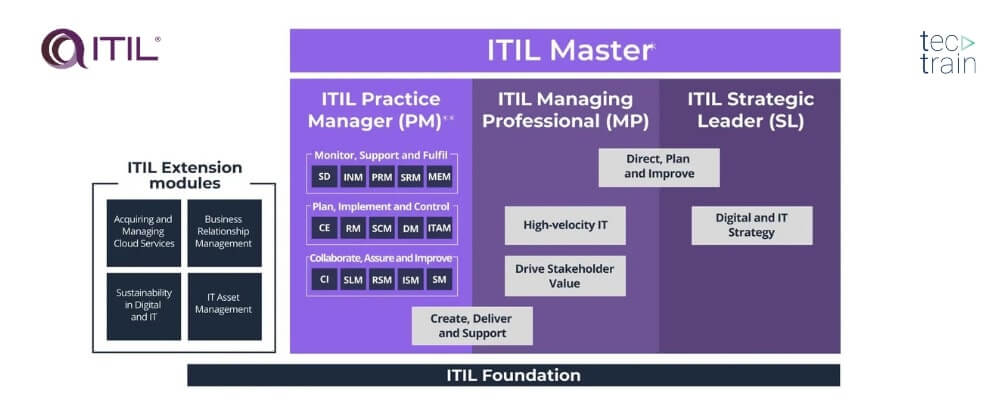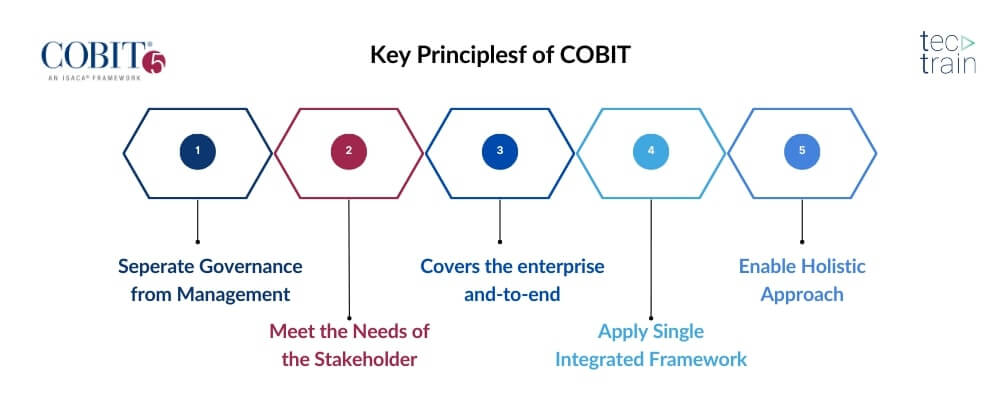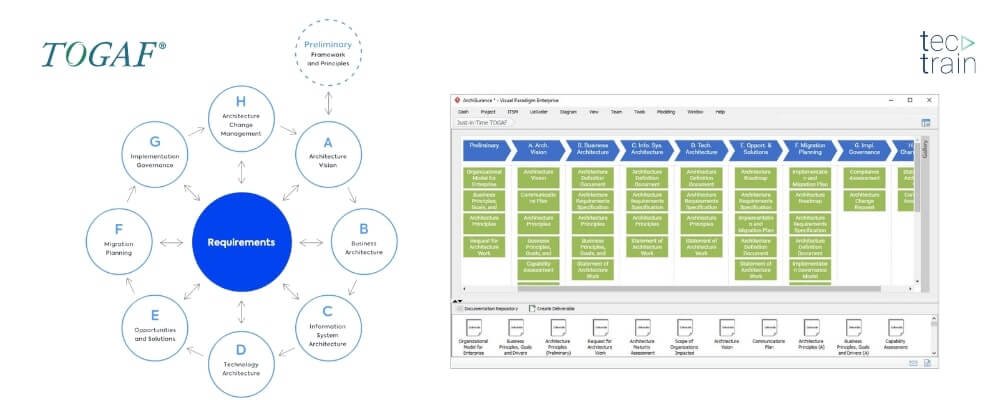Importance of IT Certifications in the Industry
In today's rapidly evolving IT landscape, certifications have become a golden ticket to career advancement. They not only validate one's skills but also demonstrate a commitment to staying updated in this dynamic field.
Speaking of which, remember John? Yes, the IT guy from two cubicles down. Word around the office is that he just bagged a hefty raise and a well-deserved promotion, all thanks to his recent TOGAF certification. His success story is a testament to the power of these certifications and underscores the pressing need for continuous learning and upskilling in the IT sector.
Whether you're an IT newbie or a seasoned professional, there's always something new to learn, and certification might just be the boost your career needs.
What is ITIL?
ITIL, or the Information Technology Infrastructure Library, is more than just a fancy acronym. It's a set of practices that play a crucial role in the IT industry. But why is it so significant?
Well, let's break it down using some insights from tectrain:
- Globally Recognized: ITIL isn't just popular in one region or country. It's recognized all over the world as a top-notch methodology for managing IT services. This means that wherever your IT career takes you, ITIL will be there, adding value to your profile.
- Aligning IT with Business: Ever heard the complaint that IT doesn't really "get" business needs? ITIL puts that to rest. It's all about making sure IT services match up with what the business truly needs. It's like ensuring the gears in a machine fit perfectly, leading to smooth operations.
- Boosting Business Growth: With ITIL, it's not just about keeping things running. It's about growth. By improving IT services and aligning them with business objectives, companies can see real, tangible growth.

And if you're wondering whether ITIL really works in the real world, consider this: A leading e-commerce company once struggled with slow website load times and frequent downtimes during sales. After implementing ITIL practices, not only did their site performance improve, but they also saw a significant increase in sales during peak times. It's real-world examples like these that showcase the power of ITIL.
In a nutshell, ITIL isn't just a good-to-have. For many businesses and IT professionals, it's a must-have. Whether you're looking to improve your IT services or boost your career prospects, ITIL has got you covered.
Featured resource
ITIL Certification at a Glance - Everything About the ITIL Training
What is COBIT?
Let's dive into the world of COBIT! If you're scratching your head wondering what it is, don't worry, you're not alone. COBIT stands for Control Objectives for Information and Related Technologies. Sounds technical, right? But let's break it down into simpler terms.
COBIT is like a guidebook or a roadmap. Imagine you're on a journey to make your company's IT processes the best they can be. COBIT is the map that helps you get there. But why is COBIT so important?
Here are some insights from experts at ISACA:
- A Comprehensive Framework: Think of COBIT as a toolkit. It's packed with tools and strategies to help businesses shape their IT governance and management. It's not just about fixing what's broken; it's about making sure everything runs smoothly and efficiently.
- Meeting Stakeholder Needs: Every business has stakeholders, from customers and employees to investors. COBIT ensures that a company's IT services are aligned with what these stakeholders need and expect. It's like making sure everyone's voice is heard and acted upon.

Now, let's talk about a real-world example. Imagine a bank that constantly faced IT glitches, from online banking hiccups to ATM malfunctions. These issues not only frustrated customers but also led to financial losses.
After adopting COBIT practices, the bank managed to streamline its IT operations, reduce glitches, and improve customer satisfaction. The result? Happier customers, reduced costs, and a stronger reputation in the banking industry.
In short, COBIT isn't just a fancy term. It's a game-changer for businesses aiming to get the best out of their IT operations. Whether you're an IT professional or a business leader, understanding and implementing COBIT can pave the way for success.
Featured resource
COBIT Certification at a Glance - COBIT Framework
What is TOGAF?
Ever heard of building blueprints? Architects use them to design and construct buildings. Now, imagine a similar blueprint, but for a company's IT structure. That's where TOGAF comes in. TOGAF, which stands for The Open Group Architecture Framework, is like a master plan for designing, implementing, and improving a company's IT architecture.
But why is TOGAF so crucial?
Here's what The Open Group, the brains behind TOGAF, has to say:
- A Solid Foundation: TOGAF isn't just a random set of guidelines. It's a certification built upon the robust TOGAF Standard, spanning both Version 9.2 and the latest 10th Edition. This means it's backed by years of industry knowledge and expertise.
- Mastering Enterprise Architecture: At its core, TOGAF is all about Enterprise Architecture - the art and science of designing and implementing a company's IT structure. It focuses on the essential skills needed to develop, maintain, and use this architecture effectively. It's not just about knowing the theory; it's about applying it in real-world scenarios.

Speaking of the real world, let's consider a global retail company as an example. With hundreds of stores across different countries, managing IT systems was a nightmare. Each region had its own systems, leading to inefficiencies and inconsistencies.
After adopting TOGAF principles, the company created a unified IT architecture. This not only streamlined operations but also improved data sharing and decision-making across regions.
In a nutshell, TOGAF is more than just a framework. It's a roadmap to IT excellence. Whether you're an IT professional or a business aiming to optimize its IT landscape, TOGAF provides the tools and knowledge to make it happen.
Featured resource
TOGAF certification: Everything about the framework
TOGAF vs iSAQB: A Detailed Comparison
Comparing ITIL, COBIT, and TOGAF
Choosing between ITIL, COBIT, and TOGAF can feel like a daunting task, but it all boils down to your individual career goals and the specific needs of your organization.
- ITIL: If you're aiming to specialize in IT service management, ensuring that IT services are delivered efficiently and align with business needs, then ITIL is your go-to certification. It's especially beneficial for those in industries like telecom, healthcare, and finance where IT service delivery is paramount.
- COBIT: For those looking to delve deep into IT governance, risk management, and ensuring that IT processes meet stakeholder needs, COBIT is the ideal choice. Its broad applicability makes it suitable for professionals across various industries.
- TOGAF: If designing and implementing IT architecture is your passion, then TOGAF is the way to go. It's perfect for those who want to ensure that a company's IT infrastructure is cohesive, efficient, and aligned with business strategy.
In the dynamic world of IT, the roadmap to success is often paved with certifications. These aren't just badges of honor; they're indicators of expertise, dedication, and a commitment to excellence.
Whether you're an individual aiming to ascend the career ladder or an organization striving for IT optimization, the right certification can be your compass. But with a plethora of certifications available, how do you choose the right one? Let's delve into the intricacies of three major players in the certification arena: TOGAF, ITIL, and COBIT, and understand their unique offerings and differences.
TOGAF vs. ITIL:
TOGAF and ITIL, while both pivotal in the IT landscape, serve distinct purposes. TOGAF, standing tall as The Open Group Architecture Framework, is all about designing, planning, and implementing a company's IT architecture. It's the master blueprint that ensures a cohesive and efficient IT infrastructure.
On the other hand, ITIL, or the Information Technology Infrastructure Library, zeroes in on IT service management. It ensures that IT services are not only efficient but also align seamlessly with business needs. While TOGAF focuses on the broader structure and strategy, ITIL emphasizes service delivery and support.
ITIL vs. COBIT:
Diving into ITIL and COBIT, we find two frameworks that, at first glance, might seem similar but have distinct focal points. ITIL, as mentioned, is the go-to for IT service management, ensuring top-notch service delivery that aligns with business objectives.
COBIT, or Control Objectives for Information and Related Technologies, takes a broader view. It's the guiding star for IT governance and management, ensuring that IT processes are robust, risk-managed, and meet stakeholder needs. While ITIL is about service excellence, COBIT ensures overall IT governance and stakeholder alignment.
COBIT vs. TOGAF:
When comparing COBIT and TOGAF, we're essentially looking at IT governance versus enterprise architecture. COBIT provides a comprehensive toolkit for IT governance, risk management, and ensuring IT aligns with stakeholder needs. It's about the bigger picture of IT's role in an organization.
TOGAF, meanwhile, is laser-focused on designing and implementing the right IT architecture for a company. It ensures that the IT infrastructure is not just robust but also aligns perfectly with business strategy. In essence, while COBIT governs and guides, TOGAF designs and implements.
In conclusion, while each of these certifications offers immense value, the choice between them boils down to individual and organizational goals. Whether it's design with TOGAF, service with ITIL, or governance with COBIT, each paves a unique path to IT excellence.
Conclusion
In the vast realm of IT, the path to success isn't always clearly marked. However, one thing is certain: the value of the right certification. Whether you're an individual looking to climb the career ladder or an organization aiming to optimize its IT processes, choosing the right certification can be a game-changer. It's not just about adding a title to your resume; it's about equipping yourself with the knowledge and skills to navigate the complexities of the IT world.
But remember, obtaining a certification isn't the end of the journey. The IT landscape is constantly shifting, with new technologies and methodologies emerging at a breakneck pace. Continuous learning and adaptation are the keys to staying relevant and ahead of the curve. It's a commitment to excellence, growth, and a passion for the field.
So, are you ready to elevate your IT game? Ready to take the next step in your IT career? Dive into one of these certifications and watch opportunities unfold. The future is bright, and with the right tools in your arsenal, there's no limit to what you can achieve.









